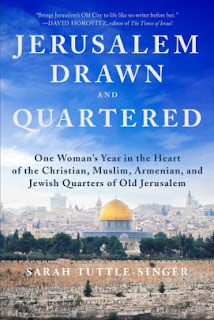Ben Cohen: The multiple faces of anti-Semitism
Several years ago, in an article for Commentary magazine, I offered a distinction between two kinds of anti-Semitic mindsets. I named the first one "bierkeller" anti-Semitism and the second one "bistro" anti-Semitism, as a way of illustrating the cultural gulf between these two forms.Don’t confuse me with facts: It’s always about the ‘occupation’
Bierkellers, or "beer cellars," were the drinking establishments in Germany that during the 1920s and ’30s were the domain of Nazi thugs. They also provided an arena for Adolf Hitler to refine his foaming gutter rhetoric targeting communism, liberalism, and most of all, the Jews. There was no attempt to camouflage or prettify any of this rhetoric, which loudly declared that the Jews were Germany’s misfortune. The thorough dehumanization of the Jews in Nazi propaganda prepared the ground for a decade of persecution that culminated in the Holocaust.
Bierkeller anti-Semitism, then, was unmistakable and instantly recognizable. But "bistro" anti-Semitism – named a bit mischievously in honor of the cozy restaurants and bars where metropolitan intellectuals tend to gather – was, I argued, harder to identify. That is because Jews as Jews are rarely the direct targets of these writings, speeches, parliamentary resolutions and so on. Instead, the bistro mindset relies upon qualifiers, codes and euphemisms that seek to separate "Jews" and "Judaism" from "Zionism," "The State of Israel," "The Jewish Establishment" and the other bugbears of progressives who advance anti-Semitic arguments while indignantly deflecting the charge of anti-Semitism as a reputational smear without foundation.
This contrast between the full-throated anti-Semitism that denies the Jews their humanity and the camouflaged anti-Semitism that denies the Jews their nationality isn’t the only difference. Arguably more important is the observation that the "bierkeller" form of anti-Semitism explicitly aims to visit physical violence upon Jews, whereas in its "bistro" form, protestations against Jewish power and privilege manifest in the main non-violently form: for example, boycott campaigns, demonstrations against pro-Israel and Zionist speakers on university campuses, the constant opprobrium poured upon the Jewish state in the halls of the United Nations, and by leading human-rights NGOs like Human Rights Watch and Amnesty International.
Still, as the years have gone by, the gulf between crude anti-Semitism and its more polite expressions (between the "bierkeller" and the "bistro") has narrowed considerably. Among the examples I would cite is the British Labour Party, where the anti-Semitic rhetoric that destroyed its reputation over the last five years was, more often than not, of the "Rothschild Bankers Rule the World" variety. (Not to mention blaming Jews for the trans-Atlantic slave trade, accusing "Zionists" of having "collaborated" with the Nazi regime and a slew of other murky fantasies that had nothing to do with Israeli settlement policy.)
Like clockwork, U.S. Secretary of State Mike Pompeo’s recent observation that “the establishment of Israeli civilian settlements in the West Bank is not, per se, inconsistent with international law” was immediately denounced by the Jewish left.The U.S. Should Stop Ignoring the Malaysian Prime Minister’s Anti-Semitism
The head of the Reform Movement in North America, Rabbi Rick Jacobs, said that the U.S. government’s new position on Israeli settlements will undercut the fight against BDS and the delegitimization of Israel in the United States, specifically on college campuses.
It’s not clear when Rabbi Jacobs was last on a campus, but the debate at North American colleges is not about the so-called “occupation” but about whether Israel has a right to exist, period. Pro-BDS groups, including “Jewish” ones, are talking about the illegitimacy of the 1949 armistice lines, not those of 1967.
Moreover, a recent survey conducted by Ron Hassner at the University of California, Berkeley shows that most students who care strongly about the “Israeli occupation of Palestinian territories” do not have knowledge of even basic facts on the subject.
Jacobs’s lack of understanding speaks to the divergent lexicon of the conflict, and more pointedly to the growing split between American Jews and Israelis. In many “progressive” circles there is little to no understanding of what areas are even in dispute; witness the continued claims that Gaza is “occupied” by Israel. For the BDS movement, everything Israeli, including Haifa and Tel Aviv, is a “settlement” and hence “illegal.”
Far more than American policy, it is the language of “occupation” that plays a key role in what has become the religion of the Israeli-Palestinian conflict. The main feature of that religion is the Palestinian claim that their (alleged) territories are “occupied” by Israel, regardless of where they are located on the map, much less in any legal sense under international law.
The mantra of “occupation,” and the demand that Israel be shunned until the “occupation” is ended—meaning the time when Israel is dissolved by the implementation of the Palestinian “right of return”—is the key demand of the Palestinians and the BDS movement.
In September of last year, Columbia University hosted Mahathir Mohamad—who served as Malaysia’s prime minister from 1981 to 2003 and returned to the office in 2018—as part of its World Leaders Forum. This year, Mahathir is expected to host the American president in Kuala Lumpur. Mahathir’s virulent anti-Semitism, notes Isaac Herzog, has never stopped democratic countries or their institutions from giving him this sort of respect—and he doesn’t even attempt to dress up his hatred of Jews as criticism of Israel:
This is a man who openly touts his anti-Semitism, repeatedly claiming Jews “are not merely hook-nosed, but understand money instinctively.” [He] has distributed copies of The International Jew—an anti-Semitic diatribe that had a key influence on the Nazis and is still banned in Germany—to his party members. Nevertheless, President Barack Obama and his wife Michelle recently visited Malaysia for the Obama Foundation’s inaugural Asia Pacific leaders gathering from December 10-14.
With over 60 percent of its population harboring negative opinions of Jews, Malaysia has the highest rate of anti-Semitic views in Asia, [excluding the Middle East]. This is despite the fact that Malaysia has no geographic proximity to Israel, has never had any conflict with Israel, and does not have many Jewish citizens—the last reported to have fled due to anti-Semitism in the early 1980s.
But the most troubling aspect of the Malaysian example is the warm welcome Mahathir receives around the world. The welcome mat has been rolled out for him time and again in global cities, top universities, and leading media outlets. Time magazine has even named him on its 2019 list of the world’s 100 most influential people for his “core values.”
While the events attended by Presidents Obama and Trump in Malaysia are important global forums, America’s leaders and their counterparts worldwide must at a minimum adhere to and reaffirm their commitment to fighting and condemning Mahathir’s anti-Semitism.














































